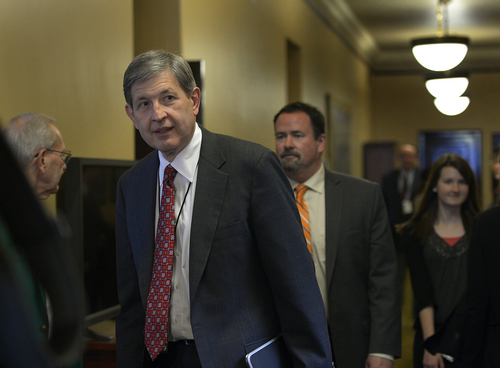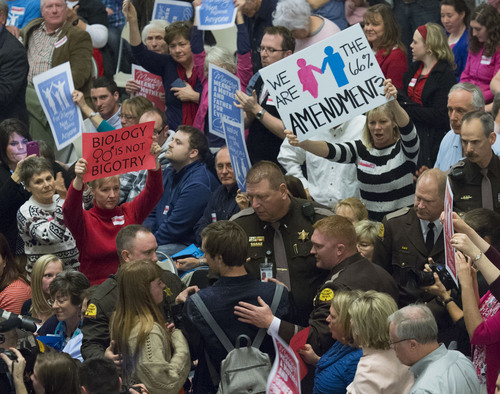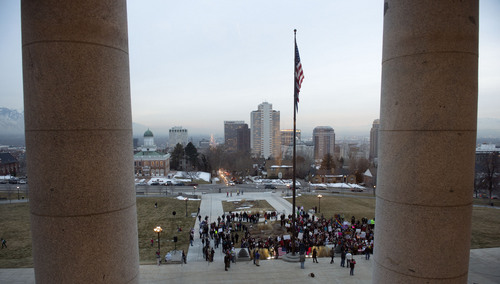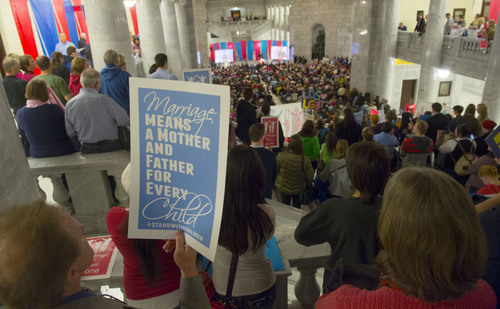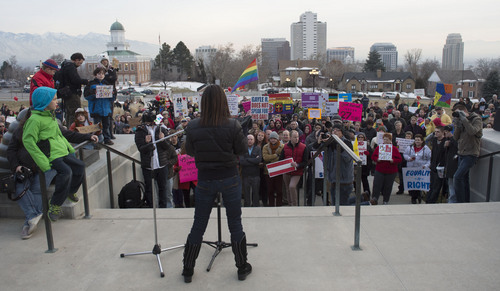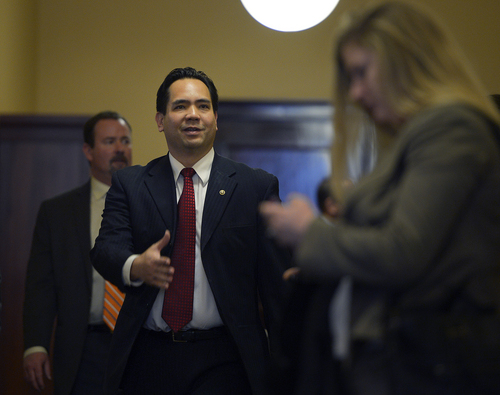This is an archived article that was published on sltrib.com in 2014, and information in the article may be outdated. It is provided only for personal research purposes and may not be reprinted.
The state of Utah offered a bold defense of its ban on same-sex marriage in a brief filed late Monday evening with the 10th Circuit Court of Appeals, arguing its prohibition of such unions is all about the long-term interests of children.
Utah has chosen a definition of marriage that is "principally a child-centered institution, one focused first and foremost on the welfare of children rather than the emotional interests of adults," the state said. "And by reinforcing that understanding, the state gently encourages parents to routinely sacrifice their own interests to the legitimate needs and interests of their children."
That definition is not designed to demean other family structures "any more than giving an 'A' to some students demeans others," the state said.
But redefining marriage in "genderless" terms, as sought by plaintiffs challenging Utah's laws, would undermine the state's objective in promoting stable families and likely result in not only reduced reproductive rates but fewer children being raised in the ideal environment provided by biological, opposite-sex parents, the state said.
The state filed the 120-page brief at approximately 11:30 p.m. Monday, beating its deadline by 30 minutes.
Seven attorneys, led by newly hired outside counsel Gene C. Schaerr, crafted the brief.
Utah Attorney General Sean Reyes issued a statement Tuesday that said the state's defense of the ban is driven by duty, rather than any political motives. He said attorneys and staff working on the case have varied personal beliefs about same-sex marriage, but are united in respecting an obligation to defend the law.
"The legal question at issue is not the fundamental right of same-sex couples to enter into exclusive and permanent relationships, raise children, or bequeath property at their death," Reyes said, since Utah law already provides those rights. "The constitutional question is whether it is reasonable for Utah's citizens to believe that a child benefits most from being raised by his or her biological mother and father in a permanent relationship, and that such relationships should therefore be encouraged through recognition as marriages."
The Sutherland Institute, a conservative policy think tank that has been an ardent defender of the state's position, called the brief "brilliant" and the state's case "impenetrable."
"The people of Utah can have confidence that their overwhelming majority view of marriage and family has been well represented," said Paul Mero, Sutherland president, adding that the brief "sets the new legal standard in defense of the state interest in traditional marriage and the natural family."
Attorneys for the three same-sex couples who are challenging Utah's ban have until Feb. 25 to file a response, and the state's final filing must be submitted by March 4.
Oral arguments are scheduled for April 10 in Denver. The three-judge panel that will hear the case — as well as an appeal from the state of Oklahoma involving a similar ban — will be picked 10 days before the hearing.
Cliff Rosky, board chairman for Equality Utah, called the state's arguments a "disappointing" rehash of stereotypes and disproved studies about gay people and same-sex parents.
"The arguments in the state's brief are the same arguments that the Supreme Court rejected last summer," Rosky said. In striking down the federal Defense of Marriage Act, the court found that the statute "actually harmed children, instead of protecting them."
"Amendment 3 has the same affect," Rosky said.
In its brief, the state argued that U.S. District Court Judge Robert J. Shelby's Dec. 20 decision overturning Amendment 3 misinterpreted legal precedents in two prevailing cases — one that upheld the right of states to define marriage and, in the United States v. Windsor case, that the federal government cannot interfere with that state decision-making authority.
Together, those opinions allow for a "diversity of outcomes" rather than a "uniform national answer" on marriage rights, the state said.
The state also said Shelby erred in finding same-sex couples sought access to a fundamental right; that that right is implicit in notions of liberty and autonomy; that history and tradition were "insufficient reasons" for a ban on gay marriage; and in comparing Utah's marriage laws to anti-miscegenation laws.
"Anti-miscegenation laws were odious measures that rested on invidious racial discrimination," the state said. "Defining marriage as the union of one man and one woman may be controversial in today's political climate, but it is hardly invidious."
Limiting marriage to one man and one woman, as Utah and 32 other states do, fulfills a compelling governmental interest rooted in tradition, social science and religion, the state said.
The attorneys said that while the state endorses no religious beliefs about marriage, its laws are supported by approximately 20 of the 25 largest faith communities in Utah who "understand marriage and sexuality as gifts from God" and primarily designed to bear and raise children.
"These beliefs are tied not only to theology but also to religious and family practices, deeply and sincerely held personal beliefs, and entire ways of life," the state said. "They are not less integral to the dignity and identities of millions of Utah citizens than plaintiffs' sexual orientation is to them."
Upending that understanding of marriage would create the potential for "religion-related strife," it said, impacting rights of religious organizations or members to carry out faith-based or business activities.
Governments face a "perennial challenge" to formally link mothers and fathers to maximize the welfare of children, it said.
"Marriage between the man and woman who create a child provides that essential link," the state said, and encourages those parents to set aside their own personal desires for the benefit of their children.
"The district court's ruling rests on a very different understanding of the principal public purpose and meaning of marriage — one centered on accommodating adult relationship choices," the state said.
But Utah has "steadfastly" reserved social recognition of marriage for man-woman marriage "so as to guide as many procreative couples as possible into the optimal, conjugal childrearing model."
"While other jurisdictions may choose to elevate adult-centric relationships, Utah has chosen a different course," the state said.
Utah's marriage laws signal "all would-be parents that the state wants them to do their best to ensure that any children they conceive are raised by their biological mother and father within a stable marital union."
And that model is working, the state said, as reflected by Utah having the lowest percentage of unwed births in the nation, the highest percentage of children being raised by both parents and low child-poverty rates.
"Such real-world benefits to children are exactly what Utah's marriage policies are intended to produce, and what the district court's decision both ignores and imperils," the state said.
Redefining marriage to include same-sex couples would "tend to encourage more parents to raise their existing biological children without the other biological parent." The state lists six other possible negative outcomes of such a move, including more out-of-wedlock births; increased divorce rates; increased nonmarital sexual activity; more children being raised by same-sex parents; making it difficult to bar other "innovations" such as group marriage; and decreased interest in marriage.
Utah also has a high birthrate, slightly above the replacement rate. In comparison, fertility and birthrates are "markedly lower" in nations and states that have embraced same-sex marriage, it said.
Utah "has good reason to fear that a judge-imposed redefinition — and the changes to the public meaning of marriage such a redefinition would entail — would over time weaken its marriage tradition enough to reduce its fertility rate, perhaps even below the replacement rate," the state said.
The laws governing marriage do not interfere with the ability of same-sex couples to enter committed, loving relationships or to raise children together, the state argues.
Instead, they "encourage a familial structure that has served society for thousands of years as the ideal setting for raising children. Nothing in the federal Constitution prevents Utah's citizens from making that choice."
Twitter: Brooke4Trib —



